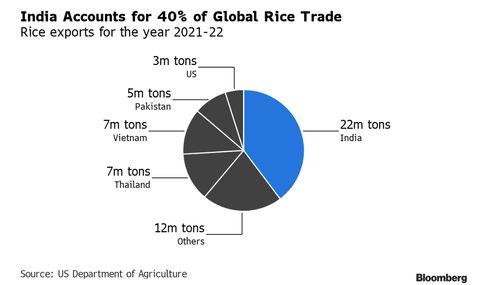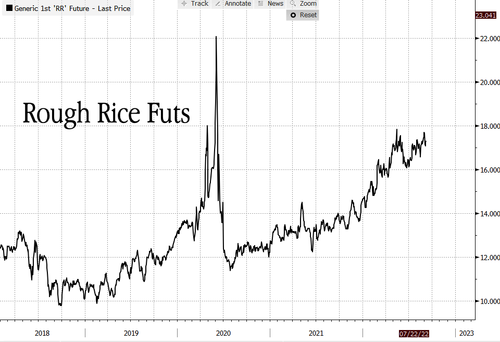
We told readers in April that the next challenge for the global food supply could be a plunge in rice production (read: here). Then in early August, severe heatwaves in India, the world's biggest rice shipper, wreaked havoc across farmland in the country, depressing crop output. Today, India restricted some rice exports and placed levies on others, exacerbating a world already squeezed by a food crisis.
Bloomberg reported India imposed a 20% duty on white and brown rice exports and banned shipments of broke rice -- parboiled and basmati rice were excluded from the export duty and/or trade restrictions. The new curbs apply to about 60% of India's rice exports and go into effect Friday.
India's clamp down on grain exports is to calm domestic prices after low rainfall during the monsoon season curtailed planting. The country accounts for 40% of global rice shipments and could spark yet another wave of food inflation for the poorest nations importing the grain.
"Such severe disruptions in global supplies, combined with a record level of consumption worldwide, should supercharge" prices and further fuel food inflation, said Sabrin Chowdhury, head of commodities at Fitch Solutions.
According to Chookiat Ophaswongse, honorary president of the Thai Rice Exporters Association, "imposing a 20% levy is a big deal ... this move will cause global rice prices to rally."
Ophaswongse said traders would be forced to purchase from rivals Thailand and Vietnam, struggling to increase shipments and will send prices even higher. India's export restrictions will be a massive blow to importing nations in Asia and Africa that consume the grain.
Persistent inflation (especially food and energy) could spark further civil unrest worldwide over the next coming months. The forecast for impending global turmoil to deepen was published in a new note by Verisk Maplecroft, a UK-based risk consulting and intelligence firm (read: here).
We told readers in April that the next challenge for the global food supply could be a plunge in rice production (read: here). Then in early August, severe heatwaves in India, the world’s biggest rice shipper, wreaked havoc across farmland in the country, depressing crop output. Today, India restricted some rice exports and placed levies on others, exacerbating a world already squeezed by a food crisis.
Bloomberg reported India imposed a 20% duty on white and brown rice exports and banned shipments of broke rice — parboiled and basmati rice were excluded from the export duty and/or trade restrictions. The new curbs apply to about 60% of India’s rice exports and go into effect Friday.
India’s clamp down on grain exports is to calm domestic prices after low rainfall during the monsoon season curtailed planting. The country accounts for 40% of global rice shipments and could spark yet another wave of food inflation for the poorest nations importing the grain.
“Such severe disruptions in global supplies, combined with a record level of consumption worldwide, should supercharge” prices and further fuel food inflation, said Sabrin Chowdhury, head of commodities at Fitch Solutions.
According to Chookiat Ophaswongse, honorary president of the Thai Rice Exporters Association, “imposing a 20% levy is a big deal … this move will cause global rice prices to rally.”
Ophaswongse said traders would be forced to purchase from rivals Thailand and Vietnam, struggling to increase shipments and will send prices even higher. India’s export restrictions will be a massive blow to importing nations in Asia and Africa that consume the grain.
Persistent inflation (especially food and energy) could spark further civil unrest worldwide over the next coming months. The forecast for impending global turmoil to deepen was published in a new note by Verisk Maplecroft, a UK-based risk consulting and intelligence firm (read: here).







